The Angel was awarded the Cross of Valour
How the memory about Oleksii Tyrpak, a Romani soldier, continues to live, even after his death
The wise one will reign above the stars
A woman clad in a white-spotted black is holding a black knife in her hands. Under the dark lace of her neckerchief, she hides the dark, glittering curls of her hair. She is staring in the middle of the letters that are carefully inscribed in the sharp blade of this metallic item.
"The wise one will reign above the stars. To the Angel, from the comrades in arms», — she reads in a quiet, frustrated voice, sighing in sorrow.
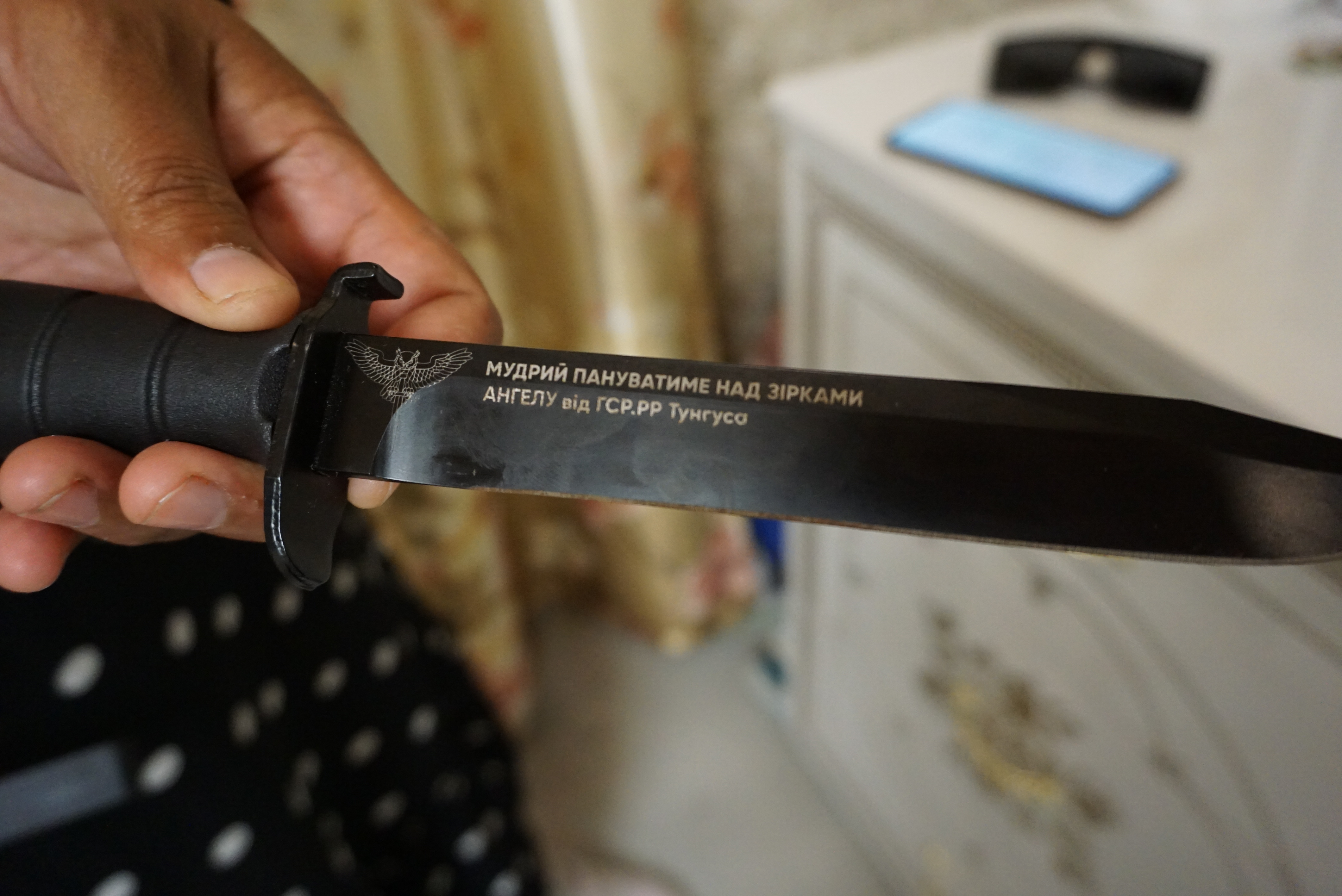
Then she skims over photos her son had sent her from the frontline. To each of those photos, she utters something, in an affectionate manner, as if talking to her son. Because she is indeed talking to him. In a spacious white chamber, on a bed, children's toys are arranged in an orderly manner. The bed linen is fresh and fits the bed perfectly. If it wasn't for Oleksii's portraits with mourning ribbons on top of them, one could have assumed that this is a future nursery awaiting an infant who is just about going to inhabit it. On a white chest of drawers, the boy's personal items are carefully assembled: his wristwatch, hands stopped at 5h. It was at 5am that Oleksii was killed in action. His posthumous letter. Certificate of Merit. His Cross of Valour. His mascot toy. His knife with custom engraving. His patches. All that becomes a warrior.
Love never goes away
«He was a very bright child, in every sense of the word. He was special. That is, perhaps, the reason why it is so difficult for me. He was our joy. He was such a cordial child; he emphasised with everything», – tells the woman.
Kristina sighs heavily. She takes a pause. Breath in. Breath in. In a spacious kitchen, there reigns complete silence. Outside, a cold September rain is showering. The storm just never ends; it covers the village with a huge thick blanket of rain. Water keeps pounding and running down the gutters, as the woman just sits there, making not a move, uttering not a word. And when she utters something, her words are suppressed by the sound of huge raindrops. Tears are running down her perfectly dark and smooth skin, like a bunch of grapes. Only her eyes, dark like the earth, are still staring somewhere ahead. Looking beyond her own life.
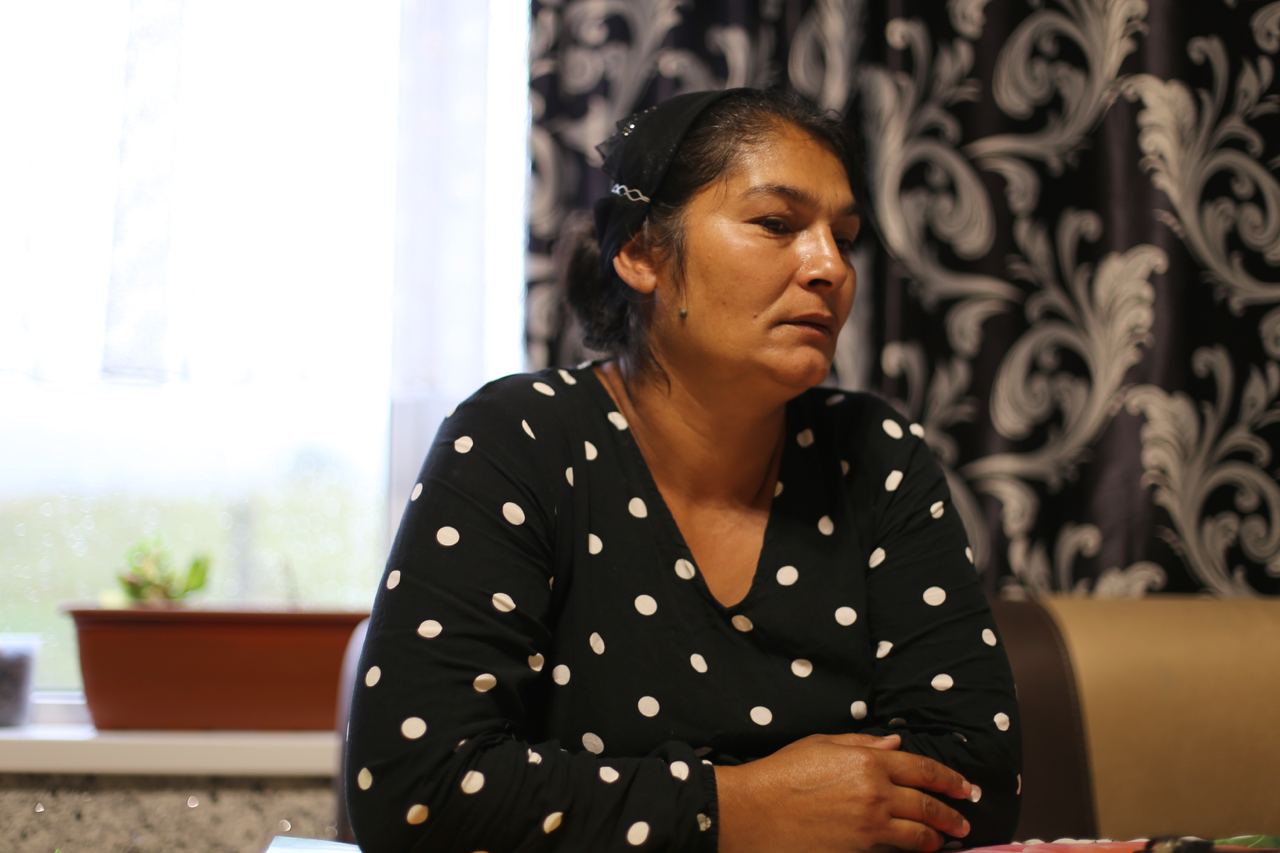
Ancestors
Kristina Fontosh is a Romani by origin. She is forty-seven years old. She was born in the city of Svaliava in Transcarpathia Province and then moved to Turia Pasika settlement where, at the age of nineteen, she married her future husband. They have been living here ever since—for over twenty years now.
Kristina's family history is complex: her grandpa came from the Polska Roma ethnic subgroup whereas her granddad was a local Roma, from Svaliava. Kristina's mother had never told her about their Romani origin, so even today, she knows nothing of where did her ancestors come from and who they were in the past. That said, Kristina has always been aware of her Romani origin. She always knew she was a Romani.
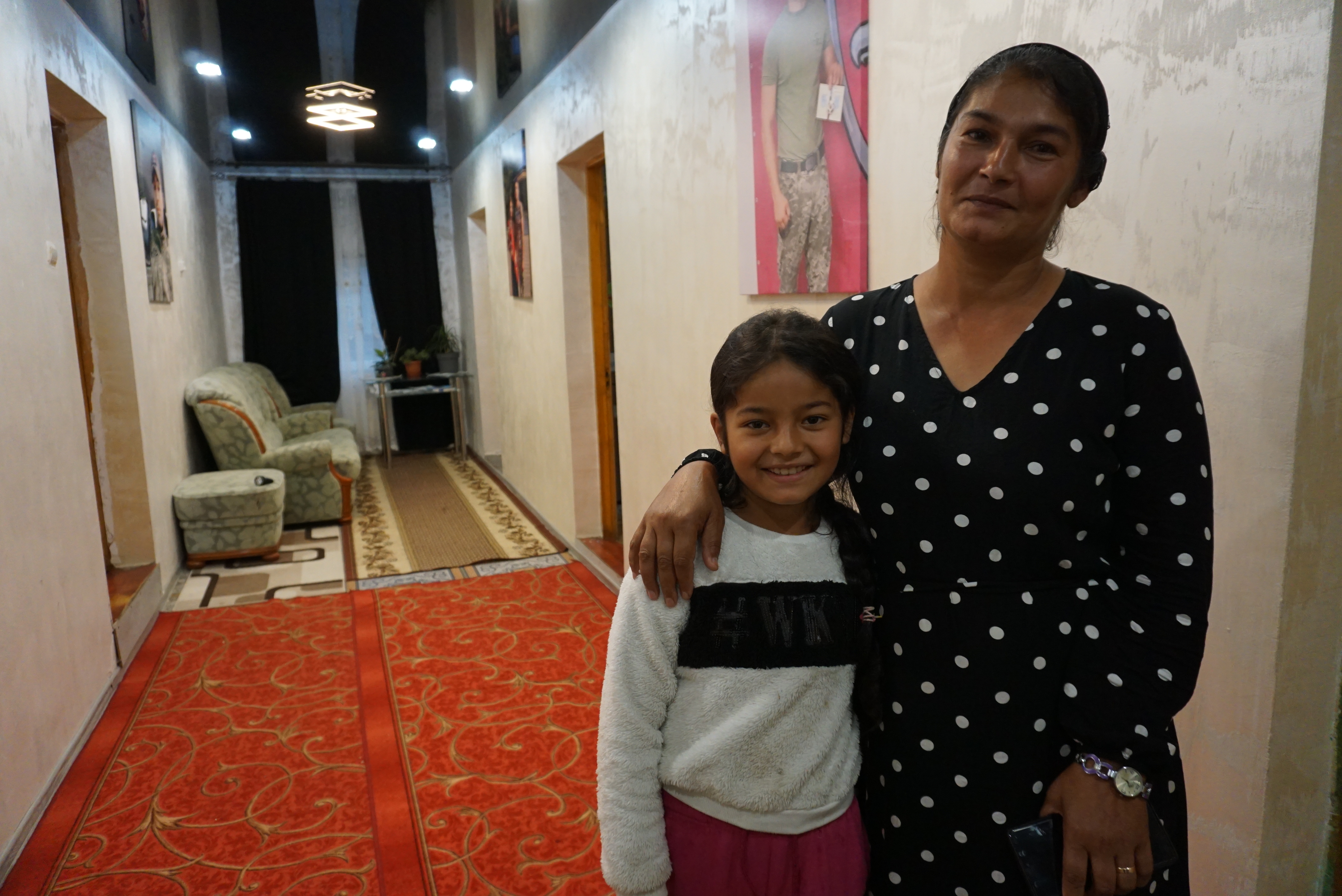
Kristina gave birth to eight children. Since the outbreak of the great war, only seven have survived. She lost her youngest son, Oleksii, who died in the frontline. After the funeral, he was supposed to celebrate his 25th birthday. Her oldest son is 27. Oleksii was the one who helped the family most: he assisted with the construction of the family home back when the family was just starting the construction. He took care of his younger brothers and sisters. He took miscellaneous manual jobs to help his family stay afloat in difficult times. Finally, he was one Mum was always proud of. She often called him «My Handsome One».
As we walk the rooms of Kristina's home, she stops at a large photo on one of the corridor's walls. The photo depicts a handsome young man dressed in the pixel uniform of the Ukrainian Armed Forces (Camouflage MM-14). On his right arm, next to his patches, there are Ukrainian and Romani flags. Like yin and yang, they are intertwined and sewn together with the same thread through his service coat. Oleksii smiles as he reminds us of the unbearable ethereality of the existence at war. Behind him are woods and fields of the Donetsk region—deep and boundless like the eyes of a woman who has petrified, unbreakable, at the image of her son.
Just flee the army, you're a Gypsy after all
«As I watched the news, how dangerous it was, I told him: «You're a Gypsy, after all, just flee the army». Being a Mum, I just wanted to spare my son the horrors of war. I did not want him to go», - says Kristina shyly, as if trying to exonerate herself. «He took offence, he was really offended. He kept saying: «Mum, how can you say something like that? How would I abandon my comrades in arms. My life is here. My everything». I never asked him for anything like that ever since», – says Kristina.
Each and every time Oleksii phoned her from the frontline was like a universe for Kristina. She was waiting for it every minute, and once she heard that voice, so dear to her, she abandoned all business and immersed in her warm conversations with her son. Oleksii kept making jokes about things. Even when the life in the trenches was hanging by a thread which was just about to break. And even when, for the first time, the enemy bullet pierced his body.
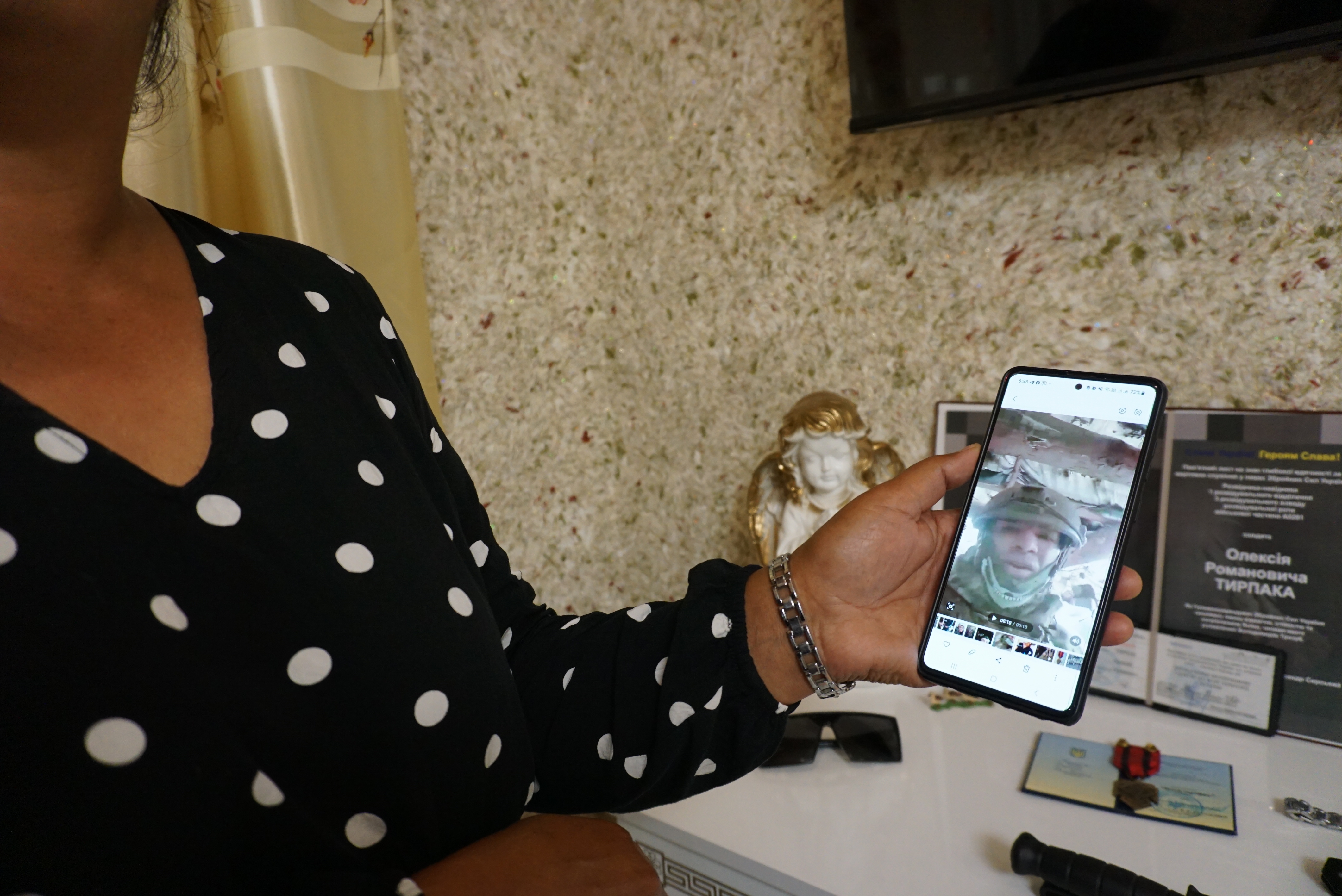
In one of the videos Kristina shows us as she is sitting at a wide table, we can see the 25-year old AFU soldier getting through a thick forest in the outskirts of the city of Sloviansk. His body is bleeding, and the bullet that has pierced his heart through the back, makes him breath heavily, as he breathes in heavy convulsions. Then, Oleksii was heavily injured after heavy shelling by enemy equipment. Nonetheless, not willing to die somewhere in the cold land of Donbas, he mustered all his strength and went ahead, singing in a cigary voice: «Oi u luzi Chervona Kalyna» (Oh, the Red Viburnum in the Meadow). His singing was not loud—but it was powerful—like the way the Ukrainian resistance used to sing as they hid in Carpathian hideouts. Only by the slight accent could we say that the boy was a Romani.
After a heavy wound and the long rehabilitation that ensued, 25-year old Oleksii Tyrpak had a chance to stay and serve at Transcarpathian Mobilisation Centre and not to return to the frontline. But the lad decided otherwise.
The Angel was awarded the Cross of Valour
Oleksii Tyrpak from the village of Turia-Pasika was a reconnaissance pointer at the First Reconnaissance Division of the Third Reconnaissance Company, Military Base A0281. In the summer of 2023, when Oleksii was heavily wounded in Donetsk region, he carried his comrade in arms out of the battlefield and did not let death get them both.
On the 21st of August of the same year, Олексій Тирпак, a Romani soldier of the Armed Forces of Ukraine was awarded the badge of the Commander in Chief of the Armed Forces of Ukraine, «The Cross of Valour» for the life he helped save.
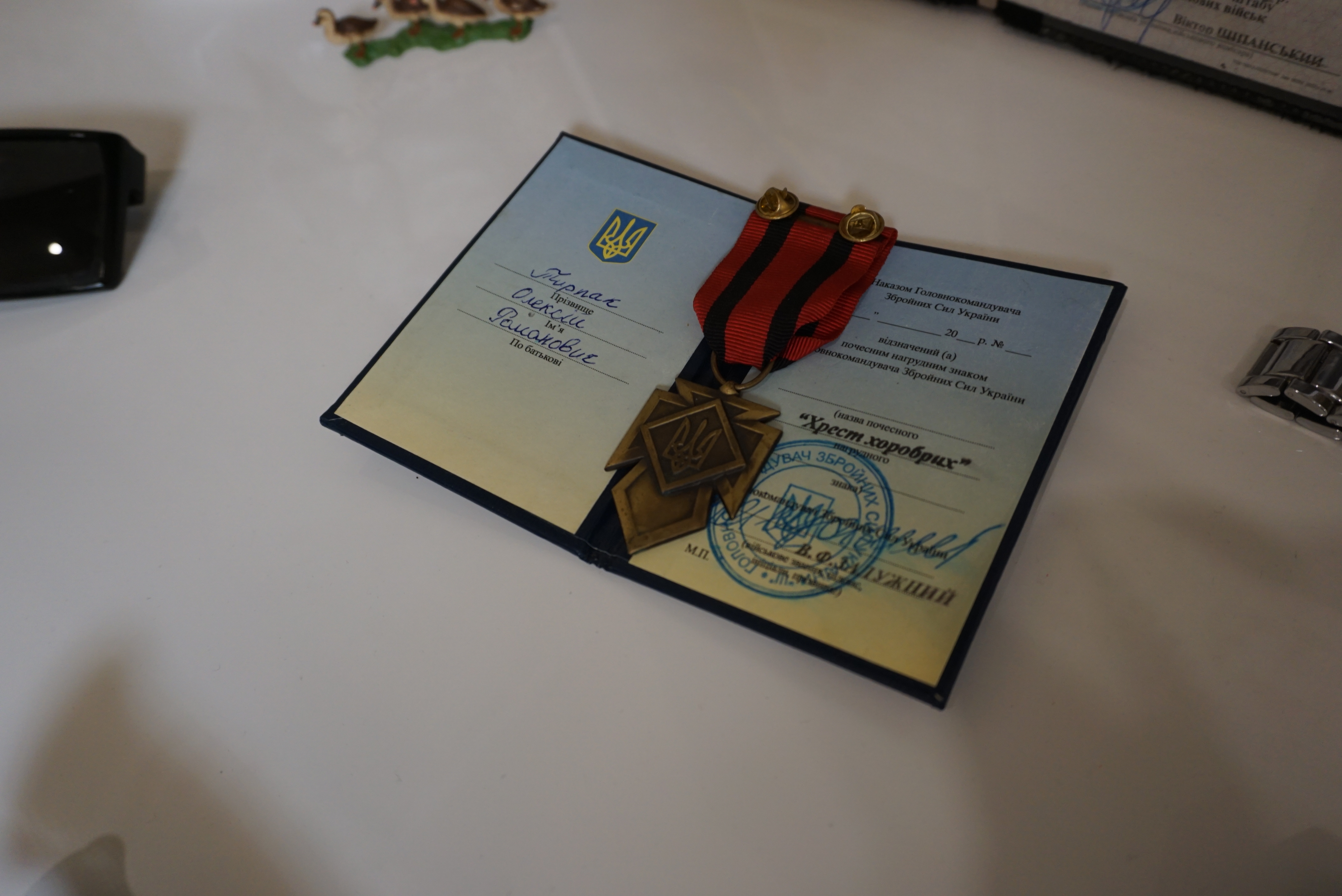
Kristina is holding her son's posthumous award close to her heart.
«This is how the boys called him (Oleksii Tyrpak – ed.) «The Angel at War». There was someone else in their company with a call sign “Demon”, so they said they needed an «Angel», too. And so, my Oleksii became an «Angel» to them. They loved him. And he loved them back», - Kristina says with a smile, for the first time in the entire interview. Her worries dissipate in her memories and thoughts. She immerses in contemplation in the midst of her quiet residence where we all are. This is how the Angel was awarded the Cross of Valour.
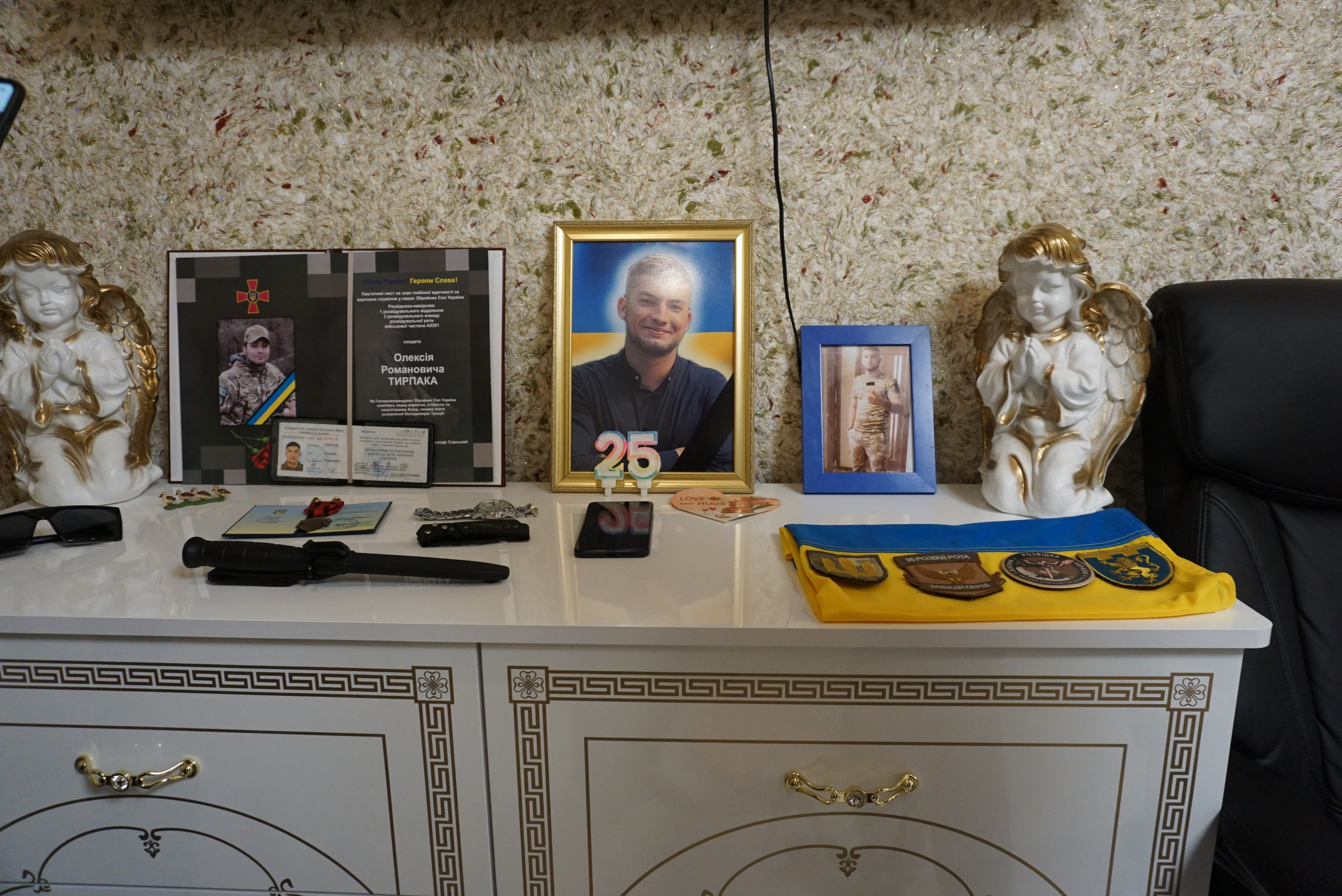
On shield
Initially, Kristina received a call from Serhii, one of Oleksii's comrades in arms. His voice trembling, Serhii told her that Oleksii is considered to be Missing in Action after the latest heavy artillery shelling in Donetsk region.
Outside, the spring of 2023 was in full bloom. The month of March was rushing into the open window and the woman was barely breathing in the spring air. She just could not believe it... It was something she so strongly feared... The death has caught up with her son. Still, she refused to believe it. She thought it was all lies. She was certain that he was alive. That he would just call her soon, or text a message, so generic yet so dear to her: «Mummy, everything is fine».
«His comrade in arms was apologising so much... So much... It was so difficult to him to tell me all this. Now I know that the worst thing for the lads is to notify mums about the death of their sons», - says Kristina as her eyes get wet, a chain of tears running down her face full of sorrow. She stoops her head and gets silent.
Oleksii Tyrpak was killed in action on the 1st of March, 2023, near the village of Terny in Donetsk Province. It took them several months to find the boy’s body. In summer of the same year, Oleksii’s parents received a call from a morgue in Dnipro City, asking them to come for a DNA test. Kristina recognised her son by the tattoo on his hand.
The Memory
The grave of Oleksii Tyrpak, a Romani soldier of the Armed Forces of Ukraine, is the first one as you enter the village cemetery of the Turia-Pasika in the Province of Transcarpathia. Here, you can see two flags: the Ukrainian and the Romani. Kristina put up two flags next to each other, in order to remind everyone that her son was a Romani who served in the Ukrainian army.
As we walk to the cemetery, dusk falls upon the village. The wet earth turns into ,mud and covers our footwear. Christina, wearing light slippers and white socks, steps into the thick mud. In a moment, her slippers turn a dark muddy colour. The cold autumn wind blows, tousling her curls which are unruly getting out of her headscarf. Heavy drops of rain fall under the sweater she had hastily grabbed as she ran out of the house. She pays no mind to the cold this autumn has brought so suddenly, nor to the deep puddles that form under her steps. She is walking to see her son again.
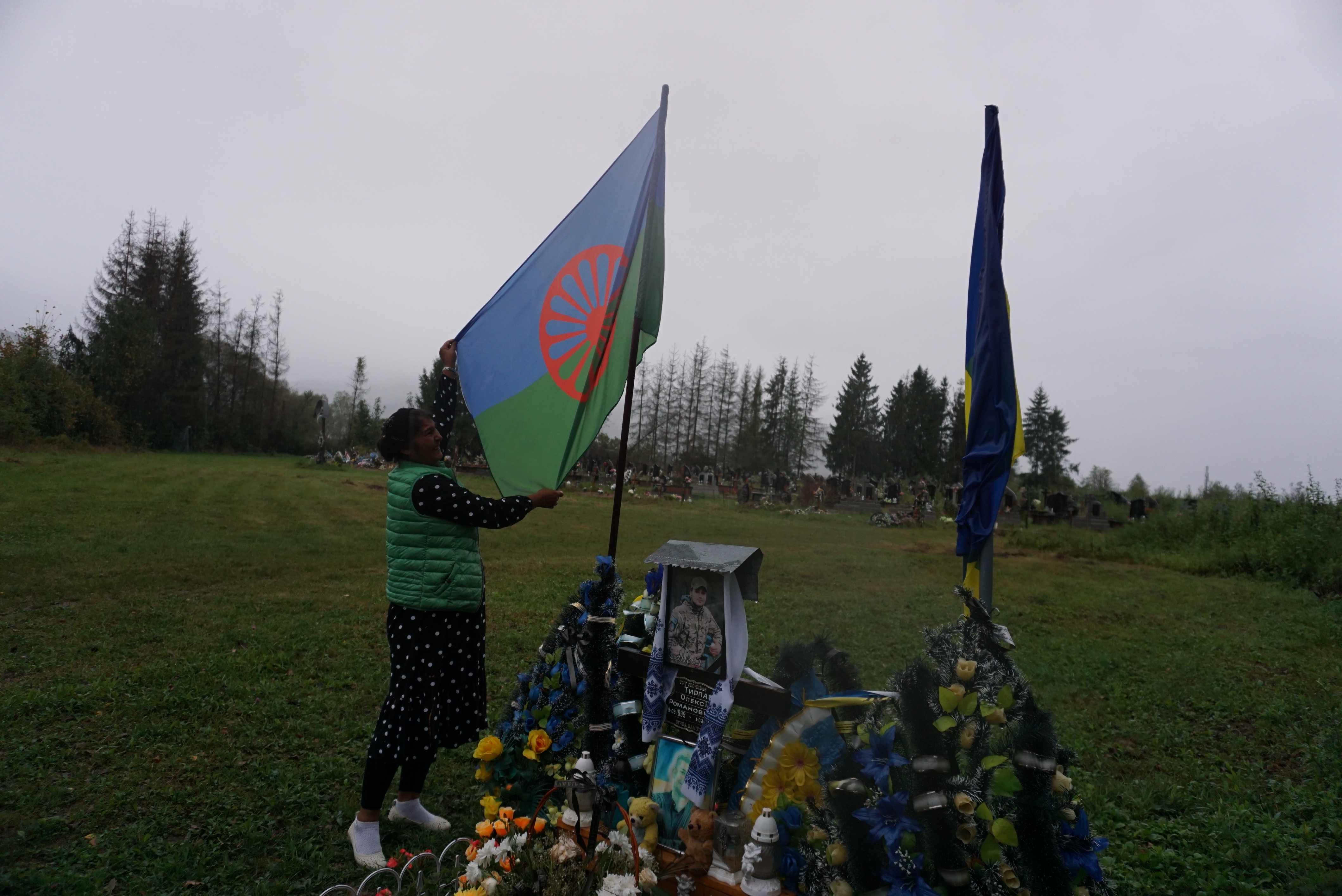
With a gentle movement of her hand, she slowly wipes the black granite with Oleksii's portrait covered in rainwater. She slowly adjusts the Roma flag, the embroidered towel, the flowers and toys on the grave. She folds his hands in prayer. He says something quietly. And then she suddenly stops talking. Now it gets completely quiet.
The dark cerebrum of night covers the village. A woman clad in a black dress with white polka dots returns to her house. She switches the light on in her son's room—to come to him, again.
And to remember.
See also
- «Невидимі. Стійкість: минуле і сучасність ромів». Як зрозуміти історію ромів через візуальну культу
- Альфреда Марковська: історія життя і порятунку інших
- «Дивись і не забувай»: 15 років Dikh He Na Bister у Кракові
- ФОТОРЕПОРТАЖ: У Києві відкрили виставку про ромську історію та ідентичність
- «Відновлення пам'яті – роми у Варшавському гетто». Історична екскурсія у Варшаві
- PHOTO REPORT: Events commemorating the victims of the Roma genocide in Babyn Yar
- 2 серпня — Міжнародний день памʼяті жертв геноциду ромів
- Коли допомога — це більше, ніж ваучер
- Антициганізм поруч: як розпізнати упередження у звичних словах і жартах
- Стереотип замість культури: як TikTok спрощує ромську ідентичність